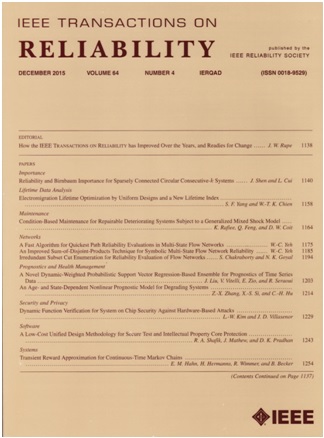利用无监督机器学习和可靠性评估估算光伏逆变器故障机制
IF 5
2区 计算机科学
Q1 COMPUTER SCIENCE, HARDWARE & ARCHITECTURE
引用次数: 0
摘要
本文介绍了一种数据驱动方法,用于评估户外光伏(PV)组串逆变器的故障机制和可靠性退化。制造商标明的光伏逆变器使用寿命会因运行地点条件的影响而变化。为了解决加速测试、状态监测或退化建模在退化估计方面的局限性,我们提出了一种以机器学习(ML)为导向的方法。利用自 2016 年起运营的 1.4 兆瓦光伏电站的数据,我们采用无监督单类支持向量机 ML 技术来分析逆变器和传感器数据,能够将湿度循环和温度波动划分为主要故障机制。利用逆变器特有的异常警报关系和警报细节,光伏逆变器的输出水平被视为其可用性或可用可靠性。随后,一个连续的马尔可夫模型被应用到六个月的警报数据中,结果显示,在连续运行 20 年后,所述平均可靠性为 20%。这些结果支持对有时限的预防措施提出建议,以提高光伏逆变器在各种户外条件下的可靠性。该方法提供了一种无损、自上而下和通用的方法,可用于分析任何暴露在室外条件下的商用光伏逆变器,但这取决于相关数据的可用性。本文章由计算机程序翻译,如有差异,请以英文原文为准。
Photovoltaic Inverter Failure Mechanism Estimation Using Unsupervised Machine Learning and Reliability Assessment
This article introduces a data-driven approach to assessing failure mechanisms and reliability degradation in outdoor photovoltaic (PV) string inverters. The manufacturer's stated PV inverter lifetime can vary due to the impact of operating site conditions. To address limitations in degradation estimation through accelerated testing, condition monitoring, or degradation modeling, we propose a machine learning (ML) oriented approach. Utilizing data from a 1.4 MW PV power plant operational since 2016, with 46 string PV inverters tied to the grid, we employ the unsupervised one-class support vector machine ML technique to analyze inverter and sensor data, capable of classifying humidity cycling and temperature fluctuations as dominant failure mechanisms. Utilizing the anomaly alert relationship and alert details specific to the inverter, the level of PV inverter output is considered as its availability or available reliability. Subsequently, a continuous Markov model is applied to six-month alert data, revealing an average stated reliability of 20% after 20 years of continuous operation. These results support recommendations for time-bound preventive measures to enhance PV inverter reliability under diverse outdoor conditions. The approach provides a nondestructive, top–down, and generalized method for analyzing any commercial PV inverter exposed to outdoor conditions, contingent on the availability of relevant data.
求助全文
通过发布文献求助,成功后即可免费获取论文全文。
去求助
来源期刊

IEEE Transactions on Reliability
工程技术-工程:电子与电气
CiteScore
12.20
自引率
8.50%
发文量
153
审稿时长
7.5 months
期刊介绍:
IEEE Transactions on Reliability is a refereed journal for the reliability and allied disciplines including, but not limited to, maintainability, physics of failure, life testing, prognostics, design and manufacture for reliability, reliability for systems of systems, network availability, mission success, warranty, safety, and various measures of effectiveness. Topics eligible for publication range from hardware to software, from materials to systems, from consumer and industrial devices to manufacturing plants, from individual items to networks, from techniques for making things better to ways of predicting and measuring behavior in the field. As an engineering subject that supports new and existing technologies, we constantly expand into new areas of the assurance sciences.
 求助内容:
求助内容: 应助结果提醒方式:
应助结果提醒方式:


